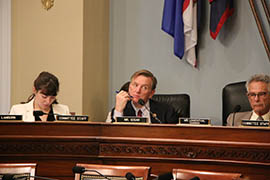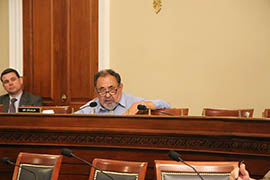- Slug: BC-CNS-Minding Uranium,700
- 3 photos, video story available (thumbnails, captions below)
By Miranda Faulkner
Cronkite News
WASHINGTON – Tribal members, environmentalists and lawmakers told a House panel Tuesday that including uranium on a list of “critical minerals” opens the door to expedited mining that will put tribal lands and national parks at risk.
They were responding to a Trump administration announcement earlier this month that directed the government to locate uranium and expedite permits for its mining as one of dozens of minerals considered essential for the country’s economic and national security.
But witnesses told a House Natural Resources subcommittee hearing Tuesday that the administration plan does not take into consideration the public and environmental health risks that come with mining, especially uranium, which has a “toxic legacy” of polluting communities where it has been mined.
“Uranium pollution remains a threat for many generations into the future,” said Amber Reimondo, energy program director for the Grand Canyon Trust. “Americans are still grappling with the devastation of uranium operations from the last time the government propped up the uranium industry.”
She was one of several witnesses testifying in support of a bill by Rep. Raul Grijalva, D-Tucson, that would order the Interior Department to remove uranium from the list of critical minerals – permanently.
Rep. Paul Gosar, R-Prescott, criticized the bill as ignoring obvious national security issues in the name of “extreme and special interest groups.”
“This bill ignores science, as well as the economic and national security of the United States,” Gosar said.
It was economic and national security that President Donald Trump cited in a December 2017 executive order directing the departments of Interior and Defense to come up with a list of non-fuel minerals that were essential to the U.S. and vulnerable to being cut off.
Interior published a list of 35 minerals in May 2018, from aluminum to zirconium, and the Department of Commerce on June 4 published a 50-page policy document aimed at ensuring a “secure and reliable” source of those minerals.
William Schneider, a national security specialist at the Hudson Institute, supported the administration’s move. Without it, he said after Tuesday’s hearing, “it’s likely to drive the uranium production entirely out of the United States.”
“The idea that we would, by regulatory changes, allow the United States to drop out of the uranium mining business is not constructive,” said Schneider, at a time when “Russia and Kazakhstan may be trying to dominate” the global market for uranium.
But Reimondo said it’s an “excuse that we need this for national security.”
Sharon Squassoni, an international affairs professor at George Washington University, agreed, pointing out that the U.S. has a stockpile of more than 585 tons of highly enriched uranium on hand, enough to make more than 23,000 nuclear weapons.
Squassoni and other opponents of the administration said little of the uranium used in this country goes toward weapon production. Mostly it is used for fuel – which contradicts the executive order calling for a list of “non-fuel” minerals.
She said that calling uranium a non-fuel mineral is “a departure of precedent” from a number of federal agencies that categorize it as a fuel. Uranium may be a strategic resource, she said, it is not critical.
Tommy Rock, an environmental scientist who lives on the Navajo Nation, said that if uranium is declared a critical mineral, it could lead to a “rush to make public lands open for business” that will lead to more pollution. He said residents of the Navajo Nation are still grappling with illnesses he believes were caused by contaminated runoff from uranium mines.
The problem isn’t isolated, he said, and it is not going away.
“The point is that there’s 15,000 abandoned uranium mines out there, and we’re only focusing on 523 abandoned uranium mines on the Navajo Nation,” Rock said after testifying to the committee.
Reimondo said past uranium mining took a toll on the Grand Canyon, with one mine on the south rim of the Canyon costing taxpayers more than $15 million to clean up. But there are other costs of listing uranium as a “critical mineral,” she said, including its affect on Americans’ health, taxes and future generations.
“Whatever decisions we make today, have the potential to threaten lives,” Reimondo said. “Not just this generation but our children and grandchildren.”
For more stories from Cronkite News, visit cronkitenews.azpbs.org.
^__=
Web links:
_ HR 3405: https://www.scribd.com/document/414526348/H-R-3405-Rep-Grijalva-Uranium-Classification-Act-of-2019
_ Committee hearing page: https://naturalresources.house.gov/hearings/uranium-mining-contamination-and-criticality
_ Reimondo testimony: http://naturalresources.house.gov/download/2-testimony-amber-reimondo-emr-leg-hrg-062519
_ Schneider testimony: http://naturalresources.house.gov/download/5-testimony-william-schneider-emr-leg-hrg-062519
_ Squassoni testimony: http://naturalresources.house.gov/download/4-testimony-sharon-squassoni-emr-leg-hrg-062519
_ Rock testimony: http://naturalresources.house.gov/download/3-testimony-dr-tommy-rock-emr-leg-hrg-062519
_ Commerce policy: https://www.commerce.gov/news/reports/2019/06/federal-strategy-ensure-secure-and-reliable-supplies-critical-minerals
_ USGS critical minerals list: https://www.usgs.gov/news/interior-releases-2018-s-final-list-35-minerals-deemed-critical-us-national-security-and
_ Executive order: https://www.whitehouse.gov/presidential-actions/presidential-executive-order-federal-strategy-ensure-secure-reliable-supplies-critical-minerals/
^__=
Amber Reimondo, energy program director for the Grand Canyon Trust, said the argument that uranium is needed for national defense is an “excuse” for more mining, which she said will affect generations to come. (Photo by Miranda Faulkner/Cronkite News)
A skeptical Rep. Paul Gosar, R-Prescott, accused committee Democrats of “ignoring global realities” that he said could eliminate domestic uranium mining and leave the U.S. reliant on hostile countries for the mineral. (Photo by Miranda Faulkner/Cronkite News)
The bill by Rep. Raul Grijalva, D-Tucson, would take uranium off the list of minerals that the White House says are critical to national security. (Photo by Miranda Faulkner/Cronkite News)


